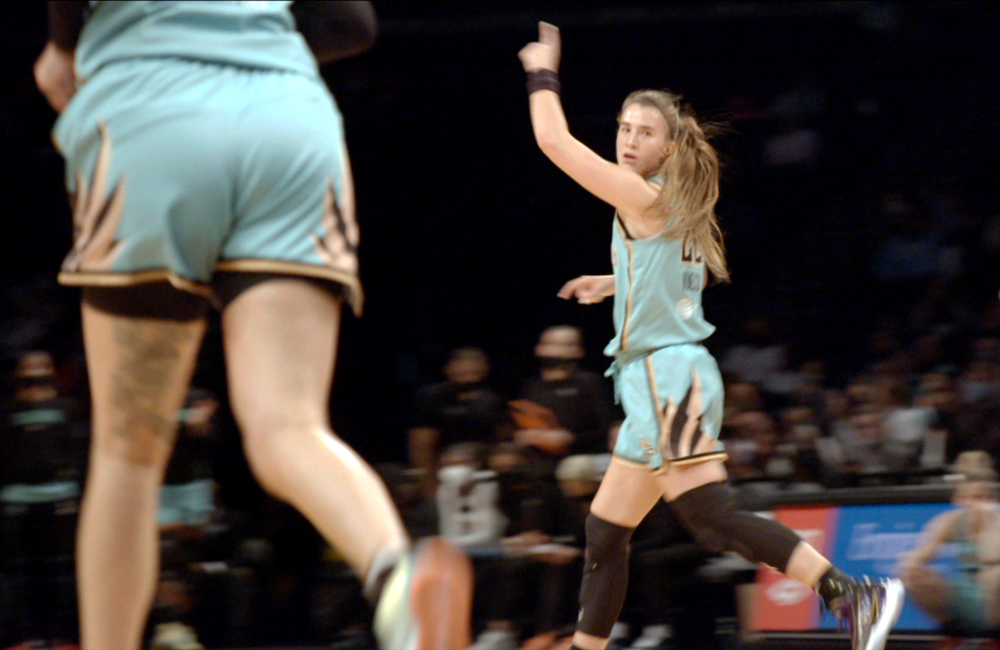The 2021 New York Liberty are an unusual team to follow for a documentary, a group made up largely of rookies that haven’t played together yet, let alone that many professional women’s basketball games, but there is something apt about “Unfinished Business” making the most of less than an ideal arrangement. With the Liberty’s co-owner Clara Wu Tsai onboard as an executive producer, the film stands out among the rash of recent documentaries about the WNBA as the league reaches its 25th anniversary, when access to the day-to-day operations of the team reveal how the ways in which the game has matured into a polished professional product while the industry around it continues to have growing pains.
You don’t bring on “AI Weiwei: Never Sorry” and “The Brink” director Alison Klayman without expecting a critical eye and although the director dutifully follows a season in which the Liberty sneak into the playoffs after going 2-20 the season before, “Unfinished Business” may take its title from a song by superfan Joan Jett (who once made a habit of bringing voodoo dolls dressed in opposing team jerseys to games), but ends up alluding to the ongoing work to improve conditions for its players. Still made to feel like second-class citizens when salaries remain so low that athletes play abroad or hold second jobs in the offseason and arenas aren’t necessarily held for home games should there be a conflicting concert, the Liberty nonetheless get a first-class treatment from Klayman, who sees little to no tension in the locker room where the influx of new players seems to create equal footing from the jump but wonders whether efforts at broadening the league’s mainstream appeal has come at a cost.
“Unfinished Business” has its own slight identity crisis at its start, bringing in members of the Liberty’s foundational squad such as Rebecca Lobo, Teresa Weatherspoon and Sue Wicks to set up what would seem to be a broader story about the early days of the WNBA before honing in on present-day Liberty. However, flipping between 1997 and 2021 begins to pull the film into focus when it’s clear the quality of play has remained the same, but there’s always been something to hold back the league from its full potential. In this respect, the Liberty are a perfect example, a big market team with everything going for it that has come perilously close to winning a title yet couldn’t seal the deal, and as the 2021 season unfolds when New York is flirting around the middle of the pack, dipping above and below .500 with each game, the film extends that feeling of treading water to a league where for one reason or another to appease a antiquated notion of a family fan base, players have felt the need to conceal their sexuality or flaunt their sex appeal or at one time fined for wearing Black Lives Matter shirts.
All of that would now seem to be a part of the past as players take ownership of their personal brand on social media and the WNBA has been active in social justice causes, though existential threats remain when there seems to be no end to those who are eager to brand the league a failure to the point where it may become a self-fulfilling prophecy. “Unfinished Business” turns into a compelling argument against any time wasted not letting its players be themselves when it’s their personalities and ability to sell themselves that shines through. An entire film could easily rest on the shoulders of DiDi Richards, the charismatic shooting guard who worked through temporary paralysis towards the end of her college career to get back on the floor for the Liberty, and you’re left wanting to know more about Michaela Onyenwere, the Nigerian-American sensation who eventually won the rookie of the year award. Yet when “Unfinished Business” is driven by the idea that no single player is bigger than the team and the team itself is just a cog in what’s trying to be accomplished in terms of equity, this is the winning portrait the athletes deserve.
“Unfinished Business” does not yet have U.S. distribution.




